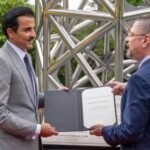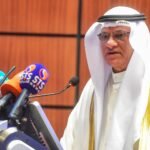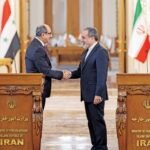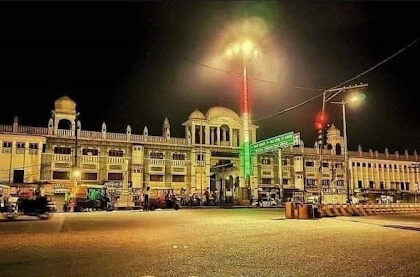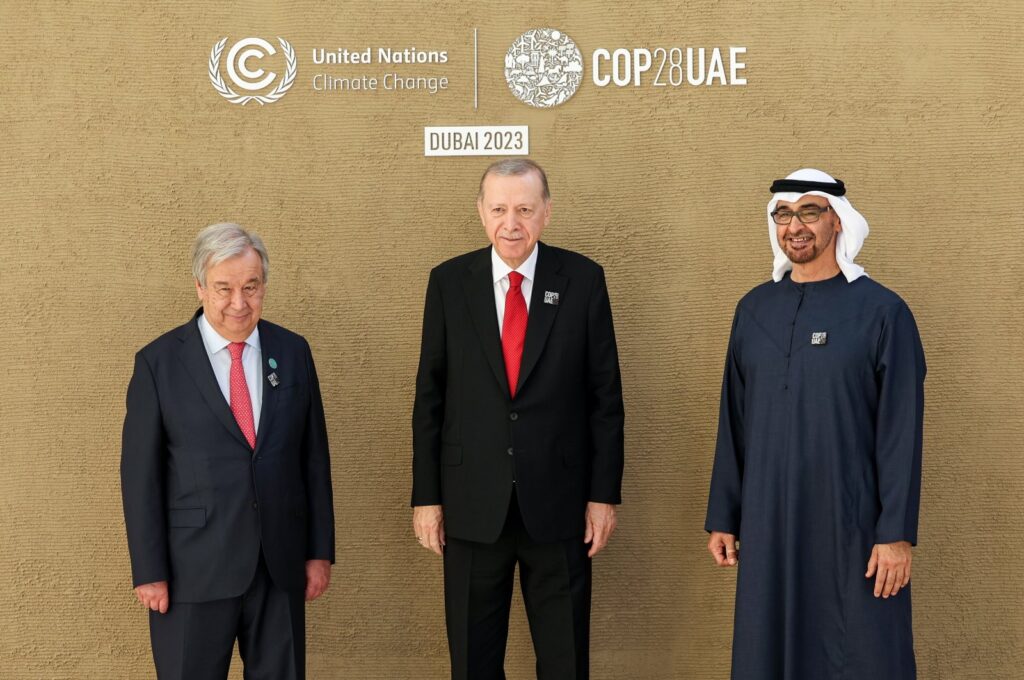
By Mohammad Tarique Saleem
President Erdoğan joined world leaders on December 1st in the UAE at the COP28 summit, stressing Türkiye’s actions for reducing emissions while highlighting another ‘crisis’ in Gaza and calling for the perpetrators to be held accountable
President Recep Tayyip Erdoğan attended the COP28 summit in Dubai, along with heads of state and monarchs. Erdoğan took part in the shooting of family photos prior to the formal opening of the high-level part of the summit, where presidents, prime ministers and other top officials addressed the gathering. In his speech to the summit, Erdoğan summed up Türkiye’s expectations while also touching on the Palestine-Israel conflict. “The loss of more than 16,000 innocent Palestinian civilians, mostly children and women, due to Israeli attacks, can in no way be justified. What is happening in Gaza is a crime against humanity; it is a war crime. The perpetrators must be held accountable under international law,” he said.
“While discussing the climate crisis, we cannot ignore the humanitarian crisis unfolding in the Palestinian territories right beside us. The Israeli attacks that have claimed the lives of over 16,000 innocent Palestinian civilians, the majority of whom are children and women, can in no way be justified. The current situation in Gaza constitutes a war crime and a crime against humanity; those responsible must be held accountable under international law. Recent events have once again brought to light the critical nature of establishing an independent Palestinian State based on the 1967 borders, with Al-Quds (East Jerusalem) as its capital. As Türkiye, we are prepared to take on any and all responsibilities that come our way during this process,” he said.
In the wake of the Ukraine-Russia conflict and the coronavirus pandemic, the world is currently confronted with the agonizing repercussions of the Gaza massacres. During each of these crises, Türkiye has advocated for a peaceful resolution grounded in principles of justice and equity. Similarly, we are approaching climate change from this vantage point. Utilizing our own resources, we are undertaking significant measures despite the fact that our historical contribution to greenhouse gas emissions is less than 1%. We expect to achieve the net-zero emissions target by the year 2053. With this in mind, we anticipate a 66.6 million-ton reduction in carbon dioxide emissions by the conclusion of the year, having doubled our target for emission reductions through 2030. At present, 55% of our installed electricity capacity is derived from renewable energy sources. We rank fifth in Europe and 12th in the world with this rate. We rank fourth globally and first in Europe in terms of installed geothermal capacity. We rank second in Europe and ninth in the world in terms of installed capacity of hydroelectric power plants,” Erdoğan said.
The president noted that Türkiye implemented its own hydrogen technologies strategy and in pursuit of a net-zero emission target, finalized its decarbonization road maps for the steel, aluminum, cement and fertilizer industries. “We intend to increase the proportion of renewable energy to 69% by 2053,” Erdoğan stressed. The president also referred to the zero waste initiative initiated by first lady Emine Erdoğan. “By means of the initiative, the waste recycling rate is projected to surge to 60% by the year 2035,” he said.
“It is widely acknowledged that these endeavors entail substantial financial input. In this regard, it is critical that we have more equitable access to climate finance resources and opportunities for technology transfer. We have not strayed from our objectives in the realms of the economy or the fight against climate change, notwithstanding the catastrophic earthquake that struck on Feb. 6. Thankfully, we are swiftly recovering from the earthquake-induced devastation that has impacted 11 provinces and 14 million individuals within our nation. We place utmost importance on the construction of climate-friendly and environmentally sustainable structures when undertaking the reconstruction of our urban areas,” he said.
Erdoğan noted that Türkiye would host the 60th session of the Intergovernmental Panel on Climate Change in Istanbul in January and Türkiye’s candidacy to host the 31st United Nations Climate Change Conference in 2026. On the sidelines of the summit, Erdoğan held talks with several prominent names attending the event, including Scottish First Minister Humza Yousaf and Italian Prime Minister Giorgia Meloni. First lady Emine Erdoğan was also scheduled to speak at the summit at a Climate Talks event. Ankara advocates for more concrete action against the impact of climate change and the prevention of global warming instead of commitment plans.
Türkiye aims to reach a net zero emission goal by 2053 and double its goal to 41% by 2030. It also revised its climate change law after consultation with relevant parties and based on scientific data. It boosted the size of its preserved areas and through ecological corridors, it expanded its green spaces. The country is also among the top three in the world with its 551 Blue Flag beaches. In addition, Türkiye leads global efforts for recycling through the “Zero Waste Project” spearheaded by first lady Emine Erdoğan. It was jointly developed on an international level last year by Erdoğan and U.N. Secretary-General Antonio Guterres.
The declaration of goodwill, initially signed by the first lady and the U.N. chief, has since been endorsed by the spouses of nearly 30 heads of state, including ones from France, South Korea, Paraguay and Cuba. Launched in 2017 by the Ministry of Environment, Urban Planning and Climate Change under the patronage of Erdoğan, the Zero Waste Project has led Türkiye’s fight against climate change. The initiative primarily aims to align the country with sustainable development principles, prevent uncontrolled waste and leave a “cleaner, developed” country for future generations.
The project received awards last year from the United Nations Development Programme (UNDP) and the U.N.-Habitat program. It was also included in an Organisation for Economic Co-operation and Development (OECD) country report in 2019 as a promising project. Recently, it was honored by the Parliamentary Assembly of the Mediterranean before the first lady was awarded the Climate and Development Leadership Award for the project by the World Bank. The zero waste initiative has already stemmed 3.9 million tons of greenhouse gas emissions and saved billions of dollars. Some 150,000 buildings across Türkiye have switched to the zero waste management system, which involves the separate disposal of garbage and recycling practices.
The ministry prepared a regulation on the issue in 2019, setting the guidelines for recycling practices. In addition, some 17 million people are said to have been educated on adopting zero waste practices since the project’s inception in 2017. Türkiye will host about 45 events on different topics during the summit. One of the highlights of the country at the summit is the Türkiye Pavillion, where events coordinated by the Ministry of Environment, Urban Planning and Climate Change are underway. The Presidency’s Directorate of Communications also set up a booth in Dubai Expo City in the context of the summit. The directorate promotes Türkiye’s zero waste campaign and screens videos about the campaign. Guests were also given the directorate’s books on the recycling movement including “Türkiye’s Zero Waste Journey for a Habitable World” and “Türkiye’s Green Development Initiative.”
World leaders descended on Dubai for U.N. climate talks on Friday, under pressure to step up efforts to limit global warming. UAE President Sheikh Mohammed bin Zayed Al Nahyan greeted Britain’s King Charles III, Indian Prime Minister Narendra Modi, French President Emanuel Macron and other leaders at the sprawling Expo City Dubai complex in the sun-soaked Gulf metropolis. The COP28 conference kicked off on Thursday with an early victory as nations agreed to launch a “loss and damage” fund for vulnerable countries devastated by natural disasters. But delegates face two weeks of tough negotiations on an array of issues that have long bedeviled climate talks, starting with the future of oil, gas and coal. A first draft of the agreement being negotiated by nearly 200 countries includes language on a “phasedown/out” of fossil fuels, which account for the bulk of greenhouse gas emissions.
The sense of urgency was heightened by a U.N. warning that 2023 is on track to become the hottest year on record, raising fears the world will not meet the goal of limiting warming to 1.5 degrees Celsius (2.7 degrees Fahrenheit). “Now the real work only begins,” the oil-rich UAE’s COP28 president, Sultan al-Jaber, said recently. “I will be rolling up my sleeves, engaging and helping address this challenge and delivering real, actionable results,” al-Jaber said, though he claimed there was “positivity” and an “optimistic” vibe following the loss and damage announcement. Al-Jaber, who heads the UAE’s national oil firm ADNOC, said the “role of fossil fuels” must be included at the U.N.’s climate talks.
The draft text sets up a fight between those calling for a “phase out” and those favoring a less drastic “phase down” of fossil fuels. But, observers said the inclusion of such language was significant. The spotlight now turns to more than 140 kings, presidents and prime ministers who will address delegates on Friday and Saturday. The U.N. chief warned of the catastrophic effects of climate change, saying that “humanity’s fate hangs in the balance.“The climate challenge is not just another issue in your inbox. Protecting our climate is the world’s greatest test of leadership. I urge you to lead,” Guterres told world leaders at the summit. The U.N. chief also said the conference should be a ray of hope in the struggle against climate change. “Make this COP a new hope for the future,” he told the world leaders attending the conference.
“You can prevent planetary crash and burn. We need leadership, cooperation and political will. And we need it now,” Guterres said, adding that climate justice is “long overdue.” Developing countries are being devastated by disasters they did not cause, he said. “Extortionate borrowing costs are blocking their climate action plans. And support is far too little, far too late,” Guterres also warned. Guterres also warned that “Earth’s vital signs are failing.” “Record emissions, ferocious fires, deadly droughts and the hottest year ever. We are miles from the goals of the Paris Agreement and minutes to midnight for the 1.5-degree limit,” he said, referring to the global temperature rise target set back in 2021 during the COP26. “But it is not too late. You can prevent planetary crash and burn. We have the technologies to avoid the worst of climate chaos if we act now.”
Guterres also mentioned his recent trip to Antarctica. “Just days ago, I was on the melting ice of Antarctica. Not long before, I was among the melting glaciers of Nepal. These two spots are far in distance but united in crisis,” he said. “Polar ice and glaciers are vanishing before our eyes, causing havoc the world over: from landslides and floods to rising seas,” the secretary-general added. “But this is just one symptom of the sickness bringing our climate to its knees.”
Bombs on Gaza
Guterres also referred to the societal and political effects of climate change. “As we see in this region, conflicts are causing immense suffering and intense emotion. And climate chaos is fanning the flames of injustice,” he said, adding that the “bombs are dropping on Gaza” in a reference to Israel’s ongoing aggression. Global heating is busting budgets, ballooning food prices, upending energy markets and feeding a cost-of-living crisis,” he said. “Climate action can flip the switch.
Cheaper renewables
The secretary-general also emphasized the importance of using renewables and said that they are more accessible than ever. “It is good for our planet, our health and our economies. Cleaning our air, meeting the world’s growing energy demand, connecting millions of people to affordable electricity, bringing stability and security to markets and saving money-renewable energy has never been cheaper,” he said. Guterres further underlined the developed countries’ importance in driving positive changes in fight against the climate change. “Current policies would lead to an earth-scorching 3-degree temperature rise. The Global Stocktake must set clear expectations for economy-wide Nationally Determined Contributions that cover all greenhouse gases and align with the 1.5-degree limit,” he said, adding that the G-20, “which represents 80% of the world’s emissions, must lead.”
Developed countries must show how they will double adaptation finance to $40 billion a year by 2025 as promised and clarify how they deliver on the $100 billion as promised. According to the U.N., COP28 will underline the need “to preserve a livable climate” while emphasizing that the production of coal, oil and gas “must rapidly decline.” Another key aim is to ramp up the use of renewable energy sources such as wind, solar, hydro and geothermal energy. The U.N. wants the capacity of renewables to triple by 2030. Financing and investments for adaptation and climate resilience “need a quantum leap,” according to the U.N.
Brazilian President Luiz Inacio Lula da Silva said on Friday that all countries must act together in the face of the threats arising from climate change. Speaking at the summit, the Brazilian leader touched on carbon emissions, the financing of climate change precautions, worldwide problems arising from the issue itself and the responsibilities that fall on the shoulders of world leaders and countries in general. “Many world leaders are committed to saving the planet,” he stressed, adding that the world has spent over $2 trillion in 2022. He questioned the amount of carbon emissions that are caused by the “missiles that cruise over the skies and fall over.”
“One percent of the richest part of the planet emits the same volume of carbon as 66% of the population,” he criticized. Touching on the natural disasters caused directly or indirectly by global climate change, such as drought and floods, Brazil’s Lula lamented that many families cannot even “feed” themselves anymore. “The injustice that penalizes the younger generation is only one of the faces of the inequalities that affect us, the world or naturalized the disparities,” he decried. Describing all these as “unacceptable in terms of income, gender and race,” he further indicated: “I can’t imagine confronting the climate change without fighting inequalities.” “To reduce socio-economic vulnerability means to build resilience, visa vie the extreme events, it also means that we should have the conditions to redirect all the endeavors to fight global warming,” he suggested.
In addition, he talked about “the non-fulfillment of the commitments” as he thinks that these “erode the credibility of the regime that is necessary to rescue the belief in multilateralism.” “It is unexplainable that the U.N., despite all the endeavors, shows itself incapable of keeping peace simply because some of its members profit from war,” he criticized, underscoring: “It is regrettable that the agreements from the Kyoto Protocol of 1997 or the Paris Agreement in 2015 are not being implemented.” “No country will solve their problems alone. We are all obliged to act together,” he said. Mentioning that his country is “willing to lead as a role model” regarding achieving the climate change goals, Lula said that Brazil adjusted them much more ambitiously than “many developed countries.”
“We have drastically reduced the deforestation of the Amazon region and we will have zero deforestation till 2030. We have formulated an ecological transformation plan to promote green industrialization, low carbon agriculture and bio-economy,” he stressed. “We have forged a common vision with the Amazon countries and we’ve built bridges with other countries that maintain tropical forests,” he praised. Meanwhile, he also pointed out the need for “decarbonization of the planet” and turning the world economy into one that does not mainly rely on fossil fuel. “We have to do it and in a way that is urgent and fair,” he advised, calling on other countries to “work in a constructive way to pave the way between COP28 and COP30” that Brazil is expected to host “in the heart of the Amazon tropical forest.” Warning all that there is no second planet Earth and “we are a unique species called humanity,” he referred to the words of Pope Francis: “We need to live within the fraternity.”


